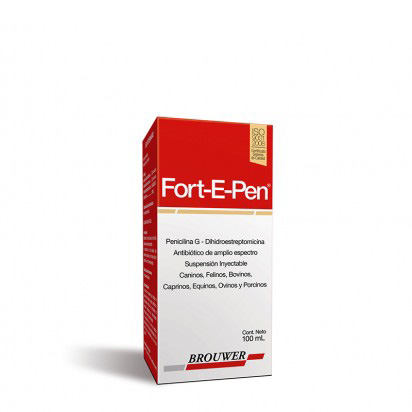Find what you are looking for
Need help?
Questions?
We will be glad to help you
Fort E Pen

- Description
- Sustained antibiotic action.
- For dogs, cats, horses, cattle, pigs, sheep and goats.
- Sterile suspension ready for use.
- Formula
Benzathine benzylpenicillin …………………….. 10 g (10,000,000 IU)
Procaine benzylpenicillin ……………………….. 10 g (10,000,000 IU)
Dihydrostreptomycin sulfate ………………….. 16,400,000 IU
Excipients q.s. ……………………………………… 100 mL- Indications
For the treatment of upper respiratory tract infections, bacterial pneumonia, enzootic pneumonia of calves, bronchopneumonia, tracheobronchitis, infections caused by Erisipela, cellulitis, abscesses and complicated wounds.
For the treatment of uterine fever in cattle, MMA syndrome (mastitis, metritis, agalactia of the sow), peritonitis, nephritis, pyelonephritis, cystitis, hepatitis, septicemia, anthrax, leptospirosis, tetanus, strangles, actinomycosis, puerperal infection, clostridiosis, post surgical infections or trauma, and diseases caused by microorganisms sensitive to the formula.
For treatment of acute or chronic systemic disease caused by germs sensitive to the association penicillin – dihydrostreptomycin.
Benzylpenicillin or penicillin G is active against: Streptococcus spp. and Staphylococcus spp. that do not produce penicillinase. It is also active against some Gram positive and Gram negative bacteria, including Corynebacterium spp., Listeria monocytogenes, Pasteurella multocida and Haemophillus influenzae. It is active against many Gram-positive anaerobic bacteria and Gram negative bacteria such as Fusobacterium spp., Peptococcus spp. and Peptoestreptococcus spp. and also some strains of Bacteroides spp. and Clostridium spp. This drug is also active against spirochetes, including Leptospira spp. and Borrelia burgdorferi. It is inactive against pseudomonads, most Enterobacteria and Staphylococcus that do not produce penicillinase.
The activity spectrum of dihydrostreptomycin includes many Gram negative aerobic bacteria, specially E. coli, Klebsiella pneumoniae, P. aeruginosa, Proteus spp and Serratia. Although E. coli and some species of Pasteurella spp, Salmonella spp and Brucella spp are susceptible to dihydrostreptomycin, this drug has limited effectiveness against these bacteria. Aminoglycosides are not effective against most gram-positive microorganisms, except Staphylococcus spp. Gram negative bacilli and some Staphylococcus spp. are susceptible. Dihydrostreptomycin-containing formulations are indicated for the treatment of infections caused by Corynebacterium pyogenes, Staphylococcus aureus, Klebsiella spp., Leptospira spp., Pasteurella spp., E. coli, Listeria spp. and Proteus spp.
- Package
Vial containing 25 and 100 mL.
- Argentina
- Bolivia
- Ecuador
- Guatemala
- Paraguay
- Peru
- Uruguay


